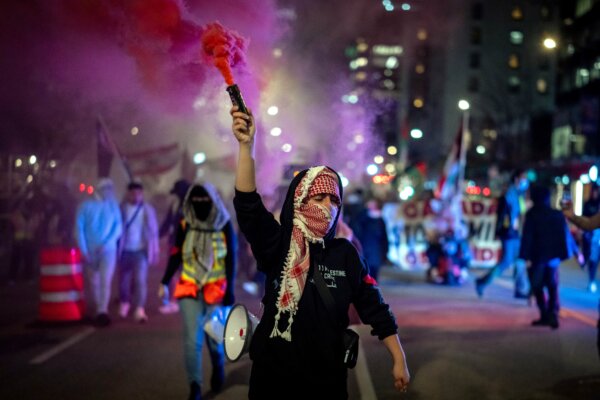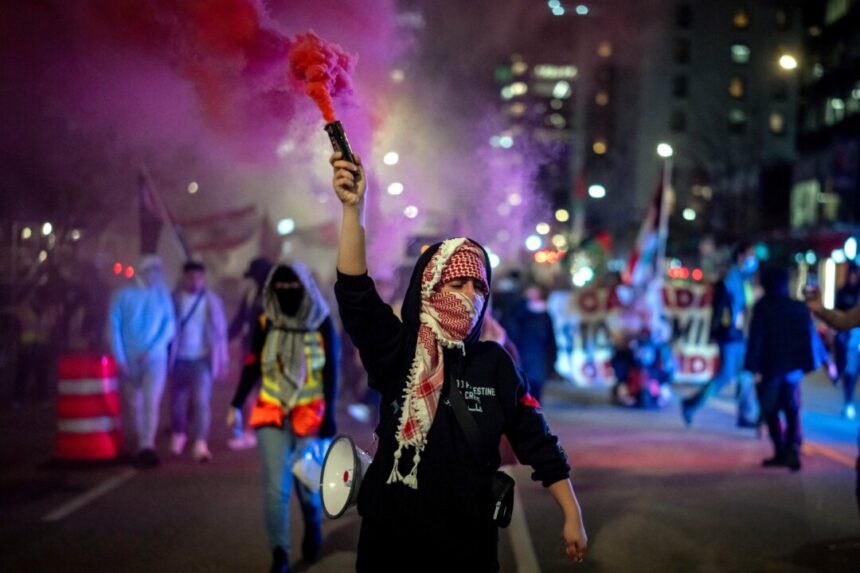
Anti-Israel demonstrations began appearing across North America shortly after the terrorist attack on Israel on Oct. 7, 2023. Initially, the demonstrations were large, with many participants claiming to advocate for peace in the Middle East. They professed to support a two-state solution and the well-being of people in the region. Despite this, anti-Jewish sentiment started to seep into the protests, which some dismissed as the voices of a minority frustrated with the conflict.
On the anniversary of the Hamas attack on innocent individuals at a music festival the previous October, the protesters abandoned any pretense of seeking peace. In Vancouver, they chanted “Death to Canada” while burning Canadian flags. They also proclaimed, “We are Hamas! We are Hezbollah!” Hamas and Hezbollah are recognized terrorist organizations with objectives to eliminate or expel all Jews from Israel. It was alarming to see supporters of terrorism marching in Canadian streets.
Canadians were shocked by the display of hate and support for such despicable acts that occurred on Oct. 7. Canada is known for being a peaceful and tolerant nation, right?
How did we reach this point?
The shift from predominantly pro-Palestine demonstrations to the current hate-filled protests has been evolving over the past year. When peaceful street demonstrations failed to attract enough attention, protesters started targeting shopping malls to intimidate customers and business owners. Subsequently, they began focusing on Jewish-owned businesses and neighborhoods. Their behavior and language became increasingly intolerant and aggressive, while politicians at all levels turned a blind eye, hoping the protests would dissipate with time. However, it is evident that the protests are not fading away.
Most Canadian politicians preferred to stay neutral. Taking a stance could lead to political repercussions due to the intractable nature of the conflict. Foreign Affairs Minister Mélanie Joly, for example, has avoided strong positions on the issue. According to a recent op-ed by Tom Mulcair, Joly justified her stance by pointing out the demographics of her riding, which has a significant Arab population. While local politics are important, the actions of a senior political figure should prioritize the nation’s needs over electoral gains.
Governments must stop delaying action. Certain boundaries must be set, and what is acceptable on Canadian streets must be clearly defined.
Restricting the right to free speech is delicate. Protesting is a fundamental aspect of democracy, even if the views expressed are unpopular. However, all rights have limitations. If masked Ku Klux Klan members marched through neighborhoods chanting for the nation’s destruction, how long would it take for law enforcement to intervene? Targeting Canadian Jews with such extremism is equally dangerous and should not be tolerated.
Offensive protests should be tolerated and protected, but advocating violence and supporting terrorist groups goes beyond free expression.
The federal government could demonstrate strength by banning organizations like Samidoun, which orchestrated the Vancouver protests. Samidoun, despite posing as a charity, has been labeled a terrorist entity in other countries. Even progressive nations like The Netherlands have banned Samidoun.
While banning a single organization may not end terrorism financing or protests, it would signal the government’s resolve. Few Canadians would mourn the loss of an organization that burns their flag and calls for their nation’s demise.
If the federal government takes a stand, provincial and municipal authorities may feel empowered to address these demonstrations when necessary.
The protests are dwindling as moderates distance themselves, allowing extremists to dominate. Without intervention, the threats, intimidation, and property damage will escalate. A tragedy is imminent if this situation is not defused promptly.
Can our leaders unite to pursue peace and order? A functional government hinges on this unity.
Views expressed in this article are opinions of the author and do not necessarily reflect the views of The Epoch Times.






